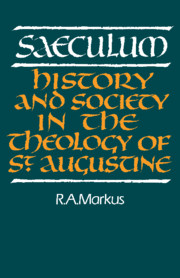Book contents
- Frontmatter
- Contents
- Introduction to the revised edition
- Preface
- Abbreviations
- 1 History: sacred and secular
- 2 Tempora Christiana: Augustine's historical experience
- 3 Civitas terrena: the secularisation of Roman history
- 4 Ordinata est res publica: the foundations of political authority
- 5 Afer scribens Afris: the Church in Augustine and the African tradition
- 6 Coge intrare: the Church and political power
- 7 Civitas peregrina: signposts
- Appendixes
- Bibliographical note
- List of works referred to
- Index
2 - Tempora Christiana: Augustine's historical experience
Published online by Cambridge University Press: 26 October 2009
- Frontmatter
- Contents
- Introduction to the revised edition
- Preface
- Abbreviations
- 1 History: sacred and secular
- 2 Tempora Christiana: Augustine's historical experience
- 3 Civitas terrena: the secularisation of Roman history
- 4 Ordinata est res publica: the foundations of political authority
- 5 Afer scribens Afris: the Church in Augustine and the African tradition
- 6 Coge intrare: the Church and political power
- 7 Civitas peregrina: signposts
- Appendixes
- Bibliographical note
- List of works referred to
- Index
Summary
We look upon the past in the light of our experience of the present. The fears and hopes we find disclosed in our own world evoke their echoes from the past as it appears to us. In a mind that is historically conscious there is necessarily some relation between its experience of the present and its evaluation of the past. The dynamic rapport between past and present in such a mind is a two-way affair. The perspectives within which it grasps the past also help to determine the shape imposed upon the present. If there is any sense in speaking of a man's ‘historical experience’, it is his total experience in relation to the way he sees the past and the future.
Augustine saw past, present and future within the theological schemes we have noticed in the last chapter. According to his favourite sixfold division of history, the world was now in its old age. This is the ‘sixth age’, stretching from the coming of the Lord in the flesh to his return in glory at the end. This is the age in which ‘the exterior man—also referred to as the old man—is undergoing the decay of old age, while the interior man is renewed from day to day’. Senescence and renewal are the two poles of Augustine's representation of the present epoch. In this chapter we shall examine the extent to which this representation prompted Augustine to take up any specific attitude to his own time. Did the notion of a mundus senescens crystallise any sense of a world in full decay, tired of life and only waiting for its end?
- Type
- Chapter
- Information
- SaeculumHistory and Society in the Theology of St Augustine, pp. 22 - 44Publisher: Cambridge University PressPrint publication year: 1989



